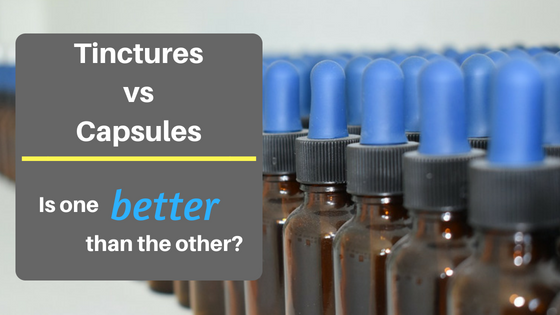For centuries, herbal therapy has been used to treat all sorts of body ailments. There's absolutely no doubt that herbs are effective and useful in both traditional and modern medicine.
Today, many health enthusiasts are now adopting herbal remedies instead of conventional factory-produced drugs.
It's also not a surprise to find different types of herbal remedies on the shelves of both pharmacies and stores.
However, there are so many misconceptions surrounding the effectiveness of methods used in administering herbal medicine.
Questions surround which method is better – tinctures vs capsules – and it has sparked a great debate in the wellness community.
In general, tinctures are considered more effective than capsule form as they are more easily absorbed by the body.
On the other hand, capsules come with measured doses that help in the effectiveness of treatment. They also boast the benefit of being tasteless.
To find out which herbal administration is better, let's take a look at the pros and cons of each, and you can decide for yourself whether tinctures or capsules are best for you and your family.
Tinctures vs Capsules in Herbal Therapy
Capsules are a convenient method of herbal therapy since they can conceal bad-tasting herbs. On the other hand, they typically aren’t as potent or absorbable as the tincture counterpart.

In an attempt to increase potency in capsules, some herbal metabolites have been separated from the herb and concentrated to a certain degree. For example, curcumin is one of the constituents of turmeric and is the primary component responsible for turmeric’s anti-inflammatory effects.
So in capsules, it is extracted and concentrated to boost the anti-inflammatory effects of turmeric.
Pros of Capsules
1. Eliminates the Bitter Taste of Herbs
As mentioned earlier, capsules mask the taste of bitter herbs. This increases the widespread adoption of herbal therapy, as most people won't hesitate to use a capsule. In addition to this, capsules don't emit any offensive odor.
2. Capsules Are economical
Capsules are produced in a variety of shapes and sizes and are cheaper when compared to the cost of tinctures.
3. Easy To Handle and Transport
Tincture bottles require caution when transporting and storing. On the other hand, capsules are extremely easy and economical to transport, and they don't usually require special precautions, except during extremely hot temperatures where melting is a possibility.
Cons of Capsules
1. Incompatibility with Soluble Ingredients
Since the constituents of capsules are usually in powdered form, it is difficult to integrate highly soluble ingredients like potassium chloride and potassium bromide.
Capsules are not suitable for materials that require moisture to form a chemical reaction.
Tinctures in Herbal Therapy
Although Tinctures are a novel method of administering herbal drugs, they are far more effective than capsule forms. In recent years, the popularity of tinctures has increased as more and more people become aware of their many benefits.
Tinctures offer a high concentration of herbal extracts soaked in alcohol. They’re generally produced by soaking herbs in alcohol to extract the herb’s medicinal benefits. In most cases, the alcohol takes on the color and scent of the herbs used in making the tincture.

You should know that most tinctures have a bitter taste, especially when herbs like horehound or blessed thistle are used. However, there are tinctures that use glycerin as its base instead of alcohol. These are sometimes called glycerites, and they provide an excellent, much more palatable alternative to alcohol-based tinctures.
Pros of Tinctures
1. Longer Shelf-life
Tinctures boast a much longer shelf-life than dried or fresh herbs. This property makes it the ideal way of preserving the chemical and medicinal properties of fresh and dried herbs. In fact, the potency of tinctures when properly prepared can last five years or more.
On the other hand, fresh or dried herbs only have a potency period of up to 8 months. Alcohol is a popular preservative for food products and even baked goods such as cakes. Therefore, alcohol preserves the freshness and potency of herbs stored in it.
2. Fast Absorption Rate
It's undeniable that tinctures take the prize when it comes to better absorption rates. Liquid extracts are easily absorbed by the body. In fact, it takes 4 minutes or less for the body to assimilate herbal tinctures. You also get a better nutrient and chemical uptake in tinctures vs capsules.
3. Flexible Dosage
The exact concentration of the inherent phytochemicals in herbal extracts is often unknown. Since herbal therapies aren’t mainstream, most people are unsure of what dose to take. Liquid extracts or tinctures provide a safe, easy way to find the right dosage for your body, since you can try a drop at a time to see how your body reacts to it.
4. Easy To Prepare
It's easy to make your own tinctures as long as you know the right herbs you need for a particular formula. Creating an herbal tincture requires an airtight glass container, an equal proportion of alcohol and water, and the right combination of herbs.
Cons of Tinctures
1. Bitter taste
Liquid extracts made from herbs like Aloe Vera, Blessed thistle and Horehound can have a pretty strong taste. Sometimes the bad taste of tinctures like Astragalus Root and American ginseng is a deal-breaker for some people.
This makes it hard for children to reap their benefits because they often can’t get past the taste. Children’s sensitive taste buds represent another benefit of glycerin-based tinctures that are sweeter and more mild.
Tinctures vs Capsules: Which One Is Right for You?
For a long time, people have been divided over choosing tinctures vs capsules as the best form of herbal therapy. Ultimately, the debate leans in favor of tinctures if potency and absorption rates are your primary concerns.
If taste and portability are most important to your family, then capsules may be your best option.

